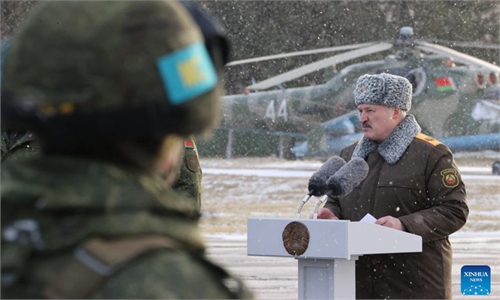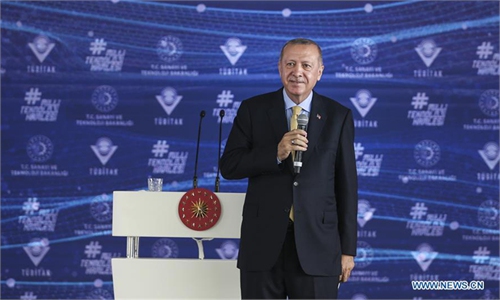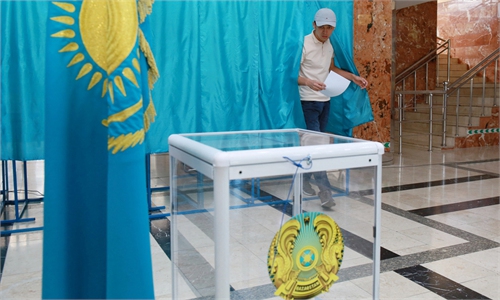IN-DEPTH / DIPLOMATIC CHANNEL
Central Asia-China cooperation crucial to regional security and development: ambassador
Good neighbors
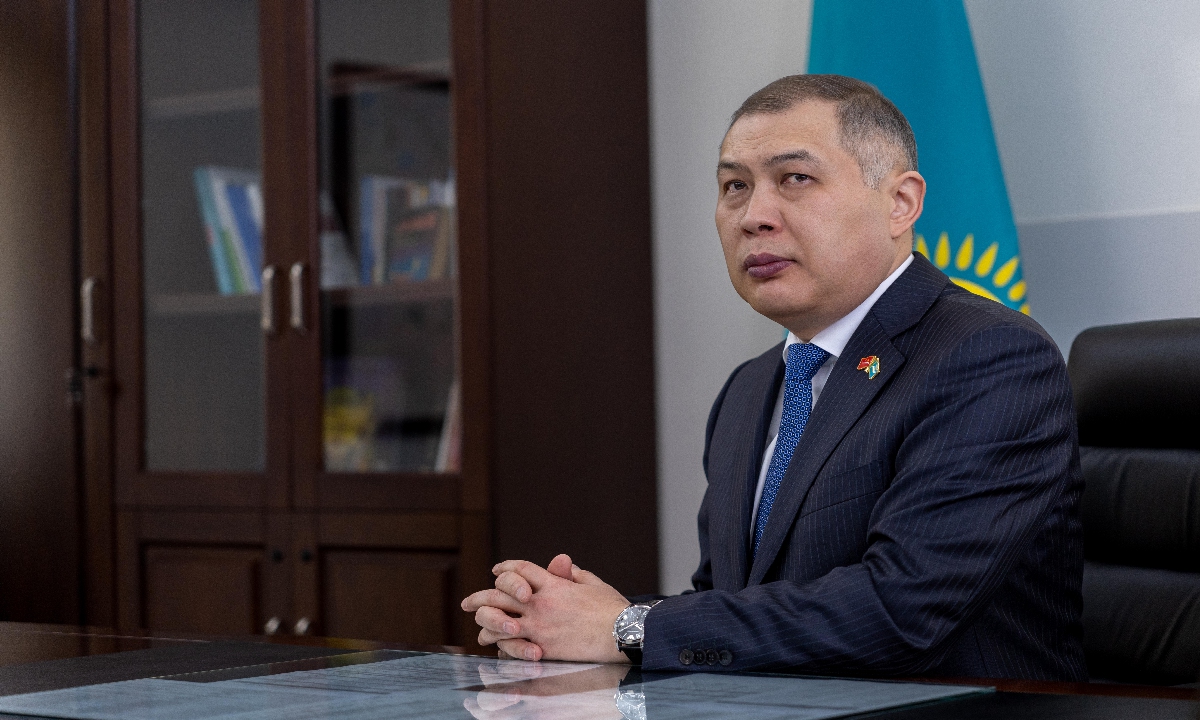
Kazakh Ambassador in China Shakhrat Nuryshev Photo: Courtesy of the Embassy of Kazakhstan in Beijing
Central Asia-China cooperation crucial to regional security and development: Kazakh ambassador (exclusive full interview)
As key member states in the Shanghai Cooperation Organization (SCO), China and Kazakhstan are expected to cooperate in ensuring regional security, fighting against terrorism, separatism, and extremism, and enhancing economic coordination under the China-proposed Belt and Road Initiative (BRI) amid the current uncertainty being seen in the global supply chains, said Kazakh Ambassador in China Shakhrat Nuryshev on Monday.
China was one of the first countries to recognize Kazakhstan's independence in January 1992, and Kazakhstan highly appreciates the level of Kazakh-Chinese strategic partnership which is considered a benchmark of interstate relations with great stability to weather any challenges, Nuryshev told the Global Times in an exclusive interview after the start of his second term as Ambassador of Kazakhstan to China.
"Our countries have no unsettled issues, no political discords. This factor creates favorable conditions for the dynamic development of trade and economic relations. Kazakhstan is interested in enhancing bilateral cooperation, building mutual trust, friendship, and good neighborliness with China," said Nuryshev.
The envoy said that despite the ongoing global pandemic, the degree of dialogue between the two countries has nearly returned to pre-pandemic levels in 2022. "From this perspective, the 'diplomacy of the heads of state' and the close personal relations of the leaders of our countries play a special role."
A lot of agreements, the practical implementation of which is contingent on the foreign services of the two countries, have been reached. In that regard, the recent visit of the Chinese State Councilor and Foreign Minister Wang Yi is very symbolic to have been made during this period of time, he said.
From June 6 to 8, Wang visited Kazakhstan upon invitation and attended the third China+Central Asia (C+C5) Foreign Ministers' Meeting, which was the first time that the C+C5 foreign ministers' meeting was held in a Central Asian country, according to the Chinese Foreign Ministry's website.
"The visit once again demonstrated the high level of bilateral relations and the steadfastness of the principles built on good neighborliness, friendship, and mutual benefit. Views have been thoroughly exchanged on the entire wide-ranging cooperation," Nuryshev said. "The parties have made progress in addressing issues of ensuring regional security, increasing trade, developing economic investment, transportation, and humanitarian cooperation."
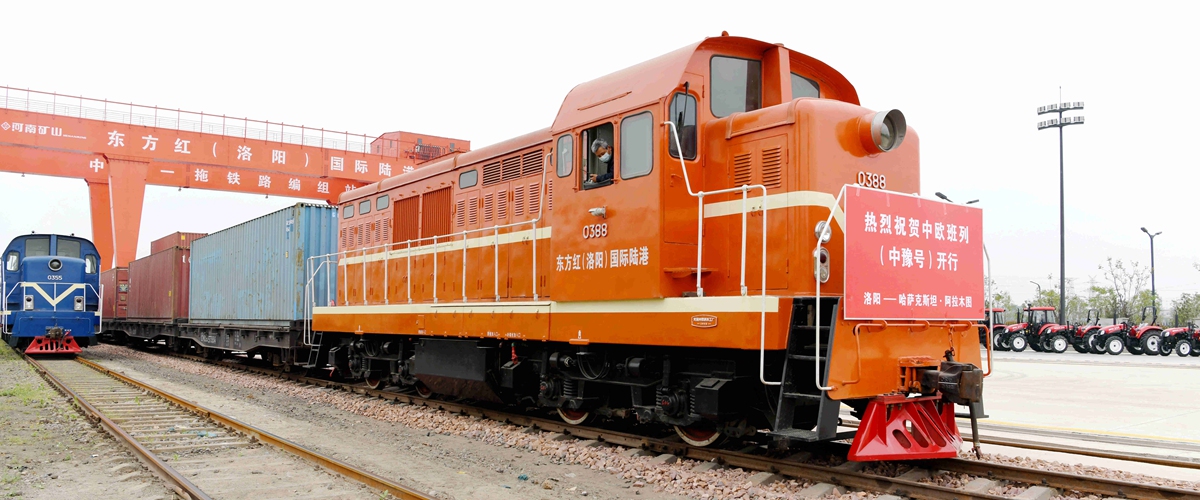
A China-Europe freight train leaves Luoyang, Central China's Henan Province for Kazakhstan on April 6, 2022. Photo: VCG
"I would like to emphasize that in just two years the Central Asia-China dialogue has proven to be one of the most effective and promising platforms for comprehensive cooperation, capable of strengthening the atmosphere of trust, neighborliness, and the constructive search for mutually acceptable approaches to addressing urgent regional and international challenges," he said.In practical terms, agreements under the scope of the format have been reached to coordinate COVID-19 prevention efforts, jointly ensure regional security, protect digital data, and upgrade regional transport connectivity, he said, adding that "I see a huge potential for Central Asia-China cooperation, I believe it is important to actively use it in order to accelerate the development of intra-regional trade and economic processes, which will allow the region to become one of the core and dynamic growth centers."
Sanctions not helping
As for the Russia-Ukraine crisis, the ambassador said that Kazakhstan, historically, has always been closely linked to Russia politically, economically, culturally, and through people-to-people exchanges, and Russia is Kazakhstan's ally legally and politically. And Kazakhstan is also interested in the early recovery of the high dynamics of broad mutually beneficial cooperation with Ukraine.
"Therefore, we sincerely believe that Moscow and Kiev will find a way to adjust their differences peacefully in the near future," said Nuryshev.
"We always take the attitude of the need to keep the dialogue going even in the most difficult situations. The use of any economic or political sanctions historically is not the most effective way to settle international disputes and conflicts.
"Kazakhstan gives every assistance in peacekeeping efforts to find ways to end the armed stand-off, address humanitarian problems and ease tension in international relations," he said.
Therefore, Kazakhstan does not intend to join the sanctions pressure on any country and take actions that would be contrary to the sense of the dialogue, said the ambassador.
The envoy emphasized that "in this regard, I believe that in order to protect our own national interests, it is necessary to make every effort to prevent these sanctions from having a serious impact on the development of our economies and the well-being of their peoples."
Cooperation in regional security
Today, in the current context of international relations, the role of Central Asia is increasingly strengthening. The security of a number of neighboring countries depends on the stability and development of Central Asia, which holds a strategically important position on the Eurasian continent, said the envoy.
"Therefore, Central Asia claims greater attention from the world powers, especially in the wake of settling the problems of regional security and socio-economic development," he said, pointing out that "China, neighboring the countries of Central Asia, as a regular member of the UN Security Council and one of the active participants in such regional mechanisms as the SCO, Conference on Interaction and Confidence Building Measures in Asia (CICA), and the 'Central Asia - People's Republic of China (CA-PRC)' format, plays an important role in supporting stability and security in the region."
Nuryshev said that in practical terms, within all these mechanisms, there is close cooperation, especially in the fight against the so-called "forces of three evils" - terrorism, separatism, and extremism.
"For example, in the SCO Regional Anti-Terrorist Structure, the competent authorities of the member states have been successfully counteracting the spread of destructive forces in the Organization's area of responsibility for a long period of time," he said.
"In turn, the SCO's three-level mechanism for fighting against drug-related crime is effectively working to block channels of financing terrorism and drug trafficking. Even the military component of the SCO has a strong antiterrorist focus."
He said the CICA has the necessary potential and matured experience to develop common confidence-building measures to fight against current challenges and threats in Asia, adding that "we are grateful to the Chinese side for its strong support of the CICA's activities and significant contribution to the promotion of the Kazakh initiative to transform the Conference into full-fledged international organization."
BRI opens new doors
In terms of economic coordination, the ambassador said the trade turnover between China and Kazakhstan has increased 70-fold over a 30-year period, which amounts to more than $25 billion, according to China's customs statistics.
"And this is not the limit. There are huge opportunities for increased bilateral trade. Now, for these purposes, our countries are actively cooperating in search of new opportunities to develop cooperation amidst the coronavirus disease pandemic and global challenges," he said.
In a recent address to his fellow countrymen, Kazakh President Kassym-Jomart Tokayev put forward a large-scale program of political modernization for the country with the main goal of a comprehensive overhaul of the entire state model of development, Nuryshev said.
He noted that political reform in Kazakhstan is being carried out on the sidelines of comprehensive economic reforms aimed at building a genuine market and a free and competitive economy.
"Amid quite a stressful international situation, the disruption to global supply chains, trade wars, and unprecedented inflationary pressure have all become a fact of life presently. In such a climate, states and businesses need to quickly adapt to the new rules of the game so as to maintain their competitiveness," said the envoy.
Nuryshev said the BRI is well-timed in that regard. The initiative has opened new doors for various states. The implementation of joint projects has enabled the resolution of such issues as the construction of new infrastructure and industrial enterprises through the involvement of advanced technologies and the creation of new jobs.
In 2014, the two countries launched a joint program and created a mechanism for coordinated efforts in industrial and investment cooperation. Thanks to this, China has been among the five largest investors in Kazakhstan in recent years in terms of increased direct foreign investment, said the ambassador.
Moreover, it has to be said that the coronavirus disease pandemic, in general, has become a catalyst for the development of digital and IT technologies, "smart" solutions, more broader so-called "new infrastructure," covering both material and virtual supplies, he said.
"We should take into account the successes and achievements of China in technological development and boost cooperation in this field," he added.
